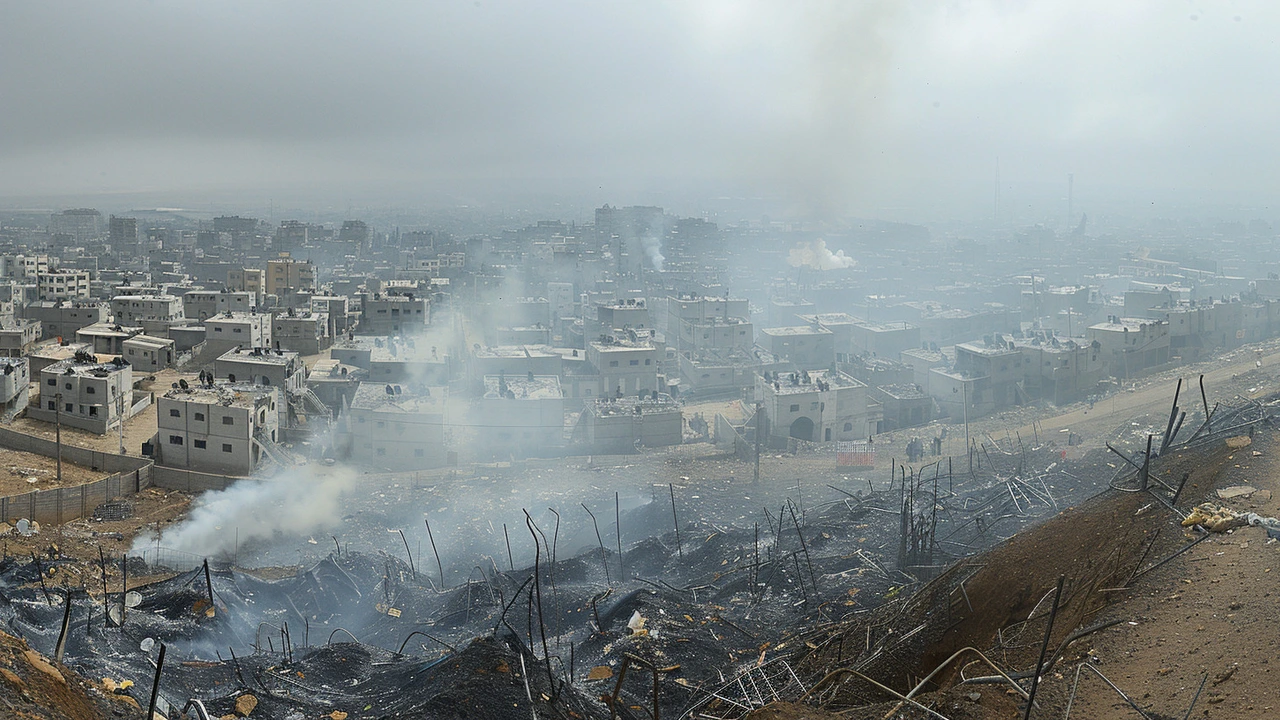Devastating Airstrike in Rafah Refugee Camp
An Israeli airstrike on the Rafah refugee camp has left a devastating impact, killing at least 45 people and injuring dozens more. Medical personnel on the ground, who were among the first to respond, described the chaotic and harrowing scene as catastrophic. The strike ignited a massive blaze, spreading quickly through the tightly packed camp, overwhelming the already strained medical facilities nearby.
The Israeli Defense Forces (IDF) have stated that the attack was aimed at senior Hamas leaders believed to be hiding within the camp. However, this operation has not only claimed militant lives; it has also caused significant civilian casualties, making it one of the deadliest single incidents in the now-eight-month-long conflict.
International Condemnation and Calls for Restraint
In the aftermath of the airstrike, global condemnation has been swift and severe. The United States led a chorus of voices decrying the strike, with officials describing the devastation as heartbreaking. The incident has galvanized a range of international actors, including the European Union, the United Nations, and countries like Qatar, Egypt, Jordan, and France, all demanding that Israel comply with recent rulings from the International Court of Justice (ICJ).
Just two days before the airstrike, the ICJ had issued an urgent directive for Israel to cease all military operations in and around Rafah. The timing of the airstrike in direct defiance of this order has intensified the global backlash. The European Union and other international bodies have urged immediate halts to hostilities, emphasizing the need for humanitarian access and protection for civilians.
Regional Tensions Escalate
The strike has further strained Israel's relations with Egypt, a key regional player and a traditional mediator in Israeli-Palestinian conflicts. This deterioration was exemplified by an exchange of fire at the Rafah crossing, an area critical for the movement of people and goods. Egypt's foreign ministry has issued strong statements condemning the airstrike, asserting that such actions only serve to destabilize the region further.
Tensions are also flaring on Israel's northern border with Lebanon, raising the specter of a wider regional conflict. Reports indicate that hostilities have ramped up in recent days, with fears that the violence could spill over into neighboring countries. The situation remains fluid and highly volatile, making diplomatic efforts increasingly complex.
Impact on Peace and Ceasefire Negotiations
The airstrike has dealt a significant blow to ongoing ceasefire negotiations. Hamas, citing what it termed a 'massacre', has withdrawn from the talks. This move casts a long shadow over any potential progress toward a truce, further entrenching both sides in their respective positions. Diplomatic sources indicate that while backchannel communications continue, the path to a lasting ceasefire appears more fraught than ever.
Observers note that the international community's repeated calls for de-escalation and ceasefire are essential but face significant challenges in light of recent events. Efforts by mediators like Qatar, Egypt, and the United Nations are ongoing but complicated by the hardening stances on both sides.
Humanitarian Crisis Deepens
Meanwhile, the humanitarian situation in Rafah and surrounding areas continues to deteriorate. Local hospitals are overwhelmed, struggling to cope with the influx of casualties and the broader impact of sustained conflict. International aid agencies are calling for urgent humanitarian corridors to facilitate the delivery of essential supplies, including medical aid, food, and water.
The human cost of the conflict is becoming increasingly unbearable. Families are being torn apart, with countless lives upended by the relentless cycles of violence. Advocacy groups emphasize the need for a comprehensive approach that not only addresses the immediate humanitarian needs but also tackles the root causes of the conflict. This calls for sustained international engagement and long-term strategies aimed at peacebuilding and reconciliation.
A Complex and Ongoing Crisis
The incident at Rafah underscores the deep complexities and persistent challenges of the Israeli-Palestinian conflict. As global actors grapple with the immediate fallout, there are no easy answers or quick solutions. What remains clear is the profound need for dialogue, restraint, and a renewed commitment to peace. Only through sustained and sincere efforts can there be hope for a resolution that addresses the legitimate concerns of all parties involved.
As we look ahead, the international community's role in mediating and facilitating peace cannot be overstated. The calls for Israel to heed international legal rulings and the pleas for Hamas to re-engage in ceasefire talks highlight the multifaceted nature of the crisis. It is a moment that demands not only global attention but concerted action to bring about a lasting and just peace.







Gerald Hornsby
May 28, 2024 AT 18:16 PMThe flames of Rafah ignite more than just structures; they scorch the conscience of the world. Every shrapnel whispers a tale of loss, echoing in the void of our collective empathy. We stand at the crossroads of silence and action, and the choice defines our humanity. Let us not be mere spectators; let our hearts speak louder than any artillery. :)
WILL WILLIAMS
June 10, 2024 AT 08:13 AMRafah's sky turned crimson, but the colors of our resolve should blaze even brighter. We can channel this anguish into a torrent of global solidarity, painting hope across the shattered streets. Every voice raised against this atrocity adds a brushstroke to the masterpiece of peace. Let's ignite compassion, not just outrage, and flood the battlefield with unwavering humanity.
Hina Tiwari
July 3, 2024 AT 11:46 AMI see the anguish in every shattered window and feel the weight of each lost heartbeat. The horror of the Rafah airstrike isn't just a headline; it's a scar on the soul of our shared humanity. Families are torn apart, children wail, and mothers clutch what little remains of their shattered dreams. It's hard to put into words the sheer enormity of grief that blankets the camp like a suffocating fog. I cannot help but think of the doctors running through burning corridors, their white coats stained with ash and blood, trying desperately to save lives that the world seems eager to sacrifice. The international community talks about condemnations, but where are the concrete actions that can halt this cycle of violence? Have we become so numb that we accept these tragedies as inevitable? The United Nations, the EU, the US-all proclaim outrage, yet the ground in Rafah tells a different story, one of silent screams. We must ask ourselves: are we content with muted sympathy or will we champion real change? The ICJ's order was clear, but the strike seemed a brazen defiance, a message that rights can be ignored when geopolitics demand it. My heart aches for the mothers who will now bury their children without a proper farewell, for the fathers who must carry the weight of loss forever. We cannot stand on the sidelines while history judges us for our inaction. It is time for humanitarian corridors to become more than a promise; they must become lifelines. Let the world hear the cries of Rafah and respond with more than words-let there be supplies, medical aid, safe passages. In the midst of this darkness, we must be the spark that refuses to let the flame of hope be extinguished. We owe it to the countless lives shattered in Rafah to fight for justice, to demand accountability, and to push for a future where such devastation is not a recurring nightmare. May our collective conscience finally awaken and move from passive outrage to active compassion.
Barry Hall
July 26, 2024 AT 15:20 PMTragic news, horrendous loss. :(
abi rama
August 7, 2024 AT 05:06 AMIt's heartbreaking to see such suffering, yet I still believe in the power of collective goodwill. Even small gestures-donations, spreading accurate info, urging leaders-can create ripples of change. Let's keep the conversation alive and turn our empathy into action.